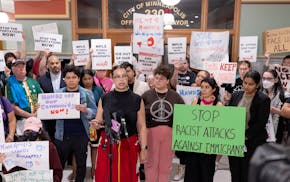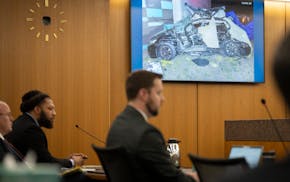Minnesota does not have enough guardians ad litem, the adults designated to fight for the best interest of an abused or neglected child in court.
Last year, Minnesota was poised to become the second state in the nation not to use volunteers to help do the work, favoring a shift to paid employees only. Then, amid pushback, the board overseeing the program reversed course.
For the first time since the pandemic hit, a new group of eight volunteer guardians ad litem is being trained. But it will be a long road to build their diminished ranks, which have fallen from more than 260 volunteers in 2017 — some of whom weren't actively handling cases — to just 12 people.
"Children really don't have a voice in courtroom except through the adults, so the guardian program is very important," said Kathleen Blatz, a former Minnesota Supreme Court chief justice who serves on the state's Guardian ad Litem Board. "To have volunteers who are so connected to the community … and, with training, are very qualified to give in this meaningful way for children — and I just think, why would we say no to that?"
Volunteer and paid guardians ad litem are appointed by the court to independently investigate a situation, including observing a child and the people in their life, and offer recommendations based solely on the child's best interest.
Across Minnesota, roughly 5,400 children have an assigned guardian but about 250 are without one, according to state data.
Having more volunteers will help address the gap, officials said, but they stressed that lawmakers also need to boost paid employees' wages.
When kids are left without a guardian ad litem, it's because of churn in those staff members and the inability to hire and retain experienced, knowledgeable workers to deal with difficult situations, board member Ann Ahlstrom said.
"We are not doing the best job that we need to be doing for our kids. This is a program that is mandated by the federal government, and it's mandated by the state of Minnesota," Ahlstrom said. "This is not a management issue. This is a funding issue and the Legislature needs to fix it."
The need for volunteers
There are 192 paid employees doing the work in Minnesota, said Tami Baker-Olson, the guardian ad litem program administrator. She hopes state legislators approve a bill seeking more than $16 million, which she said would largely go toward increasing employees' pay and would also pay for two more supervisors to oversee volunteers.
Some officials who wanted to phase out volunteers had cited concerns with inadequate supervision, as well as security risks from their access to confidential information. Baker-Olson said they have addressed concerns with volunteers' emails to ensure data is protected and they work in a secure case management system.
Those who sought to end the volunteer program also pointed to a 2017 National Center for State Courts review that suggested the full-employee model would be more efficient. A more recent Minnesota Management and Budget analysis said volunteers offer comparable performance and some cost savings, but warned that they are perceived as less consistent in following standards and suggested they instead shift to mentorship or advocacy roles.
Last year, the State Guardian ad Litem Board was set to vote on a staff recommendation to end the volunteer program, Ahlstrom said. But, she said, judges and other community members argued that volunteers were valuable, and the majority of board members agreed and decided to rebuild the program.
Apart from North Dakota, which doesn't use the volunteer model, no other state is intentionally moving away from that approach, said Sally Wilson Erny, with the national Court Appointed Special Advocates/Guardian ad Litem Association. The group recruits and helps support volunteers advocating for abused or neglected children in the court system.
There are standards for how volunteer guardian ad litem programs operate, like having one supervisor for every 30 volunteers, she noted, and said she has not heard data security concerns from other states.
Minnesota was a leader in the national volunteer guardian ad litem movement more than 40 years ago, she said, and it's sad to see how the program has diminished.
"Children need more people, not less," Wilson Erny said. "Volunteers are more important now then ever."
Intense training
Volunteers have included attorneys, teachers, social workers, corporate employees and others who bring a "rich tapestry" of experiences and fresh eyes to the work, said Gerard Bodell, board president of the Minnesota chapter of the national organization.
Amy Boley, who works in product management at Thomson Reuters, is one of the new volunteers currently receiving training. She first heard about guardians ad litem while attending law school more than 30 years ago and felt drawn to the work but became busy with her career and family.
In 2020, when her kids were in college, and she wanted to start volunteering, but training for guardians was interrupted. When the state board opted to restart the volunteer program, she said she was asked if she was still interested and started training in March.
"The training is intense and substantial and it's very good," Boley said. "You are dealing with people's lives at a time that they are dealing with one of the most stressful — if not the most stressful — thing in the world, which is having your children potentially taken away."
While attorneys and social workers play important roles in child protection cases, she said a guardian ad litem has a unique position, with their sole focus on the child' best interest.
"That voice is something that is really important for a judge to hear," she said.

Minneapolis City Council lowers street food cart license fee, hoping fruit sellers will hawk legally

How the federal raid unified the fractious Minneapolis City Council against Trump, sort of
Trump travel ban 'cruel,' Minnesota advocacy group says

No verdict after first day of jury deliberation in Derrick Thompson murder trial for crash that killed 5

